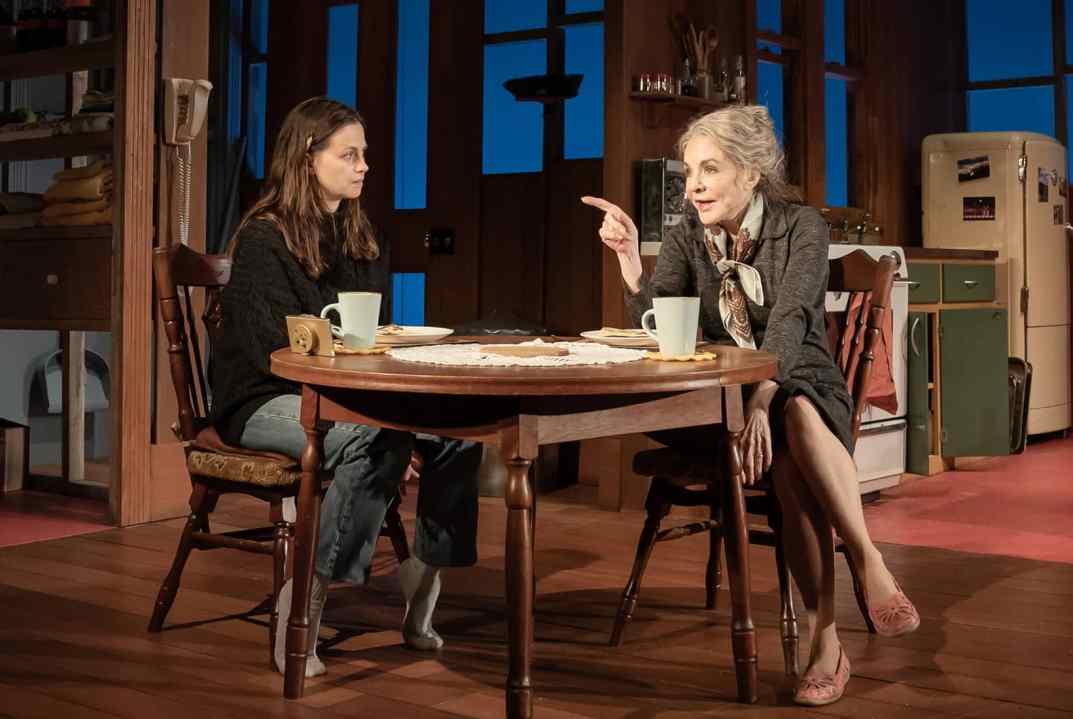’night, Mother is a two-hander that opens like a comedy sketch. ‘I’m going to kill myself, Mama,’ says Jessie. She’s cleaning a pistol and loading it with bullets. ‘I’ll shoot myself in a couple of hours.’ The pair live together in a lonely farmhouse, and Jessie wants to make sure her mother will be able to cope after her death. She tours the kitchen explaining where the fuses and the cleaning materials are kept. Mama, who doesn’t seem unduly alarmed, offers to phone her son and get him to thwart the suicide attempt. ‘I’ll just have to do it before he gets here,’ says Jessie.
This is an intensely dramatic set-up which ought to be either gripping or hilarious, or both. Somehow it lacks punch. The script, by Marsha Norman, has the kind of homely wit that we associate with Alan Bennett. Jessie suffers from epilepsy which has prevented her from pursuing a career. She failed in telesales because ‘I didn’t even make enough money to pay the telephone bill’. And she was dismissed from a hospital gift shop: ‘I made people real uncomfortable smiling at them the way I did.’
Should the Barbican be staging a work that appears to advocate the murder of a named individual?
Mama is adept at observational comedy too. She has a best friend, Agnes, whose clumsiness is legendary. ‘She’s burned down every house she ever lived in.’ The accidental fires became a local attraction. ‘One time she set out porch chairs and served lemonade.’ Agnes also has a passion for exotic birds which she purchases with borrowed money. ‘She’s still paying on the last parrot she bought.’ That’s a great line. But the danger is that these quirky off-stage characters will become more interesting than the personalities in the story. The viewer starts to wonder if the clumsy Agnes will show up and try to grab the pistol from the suicidal Jessie. But no, it’s just a mother and daughter circling each other for 90 minutes. The script is nearly 40 years old and today’s audiences expect more narrative complexity. Although it’s funny and moving at times, it isn’t funny or moving enough.
The ushers at the press night of PRIME_TIME handed out earplugs to the audience. ‘It’s a noisy show,’ they warned. They should have given us a blindfold too. This spectacularly ugly caper is about Jeff Bezos and his space programme. The action takes place in a scruffy warehouse scattered with Amazon boxes and surrounded by cheap plastic drapes. Two half-naked women enter, garishly lit, while a soundtrack thrashes out the kind of raucous techno beat that makes dogs whimper. The women pick up baseball bats and vandalise the Amazon boxes while yelling abuse at Bezos. They condemn his baldness, his excessive fortune and his phallomorphic space rocket. And though they insist that he has a fixation with his penis they seem unaware that this obsession is theirs, not his.
Time and again they yell the same trio of questions at Alexa, Amazon’s robot: ‘Alexa, why is he so bald? Why is he so rich? Why is his rocket shaped like that?’ These are interesting issues, of course, but Alexa fails to supply informative answers. Baldness is caused by genetics, hormones and ageing. Bezos’s wealth arises from millions of contracts agreed freely between Amazon and its customers. And the shape of his rocket owes more to aerodynamics than to human anatomy. However, the women have no interest in listening to answers only in bawling out their questions at top volume and enjoying the noise of their poisonous militancy. A psychiatrist would recognise them as violent offenders: they’re stupid, angry, amoral, and not averse to using force if necessary.
Next, their puerile rant takes a dangerous turn. They describe flying to America and making their way to a town where Bezos owns a home. (They name the town and reveal the cost of the journey.) They imagine breaking into his property and waking him at night. After torturing and killing him, they pack his body parts into Amazon boxes. At no point do they consider their actions wrong, let alone illegal. It seems extremely reckless nowadays to describe a homicidal fantasy in such specific detail. Had the target of this psychotic drama been a wealthy Briton, such as Stormzy or Lewis Hamilton, the producers would have faced a grilling from the authorities. The Barbican’s joint directors should ask themselves if they’re justified in staging a work that appears to advocate the murder of a named individual.
The same applies to the Royal Court, which in June hosted a drama about two angry pipsqueaks who hatched a plot to kill the American entrepreneur Kylie Jenner. Another publicly funded playhouse, Theatr Clwyd, produced a play in 2018 that explicitly considered the execution of Katie Hopkins. The commissioners of such work should be more circumspect. And the Arts Council needs to explain why it uses tax-payers’ money to fund dramas that condone terrorism.








Comments